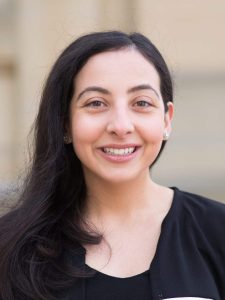Amanda Ajrouche
Staff
What is your area of research or expertise that you bring to the Landscapes collaboration?
I recently graduated with my MSW from the University of Michigan School of Social Work, and my curriculum focused heavily on racial disparities, and the consequential effects on health and overall well-being. The interconnectedness of oppression and suffering is such that a holistic approach is necessary and can help create more sustainable approaches
What do you find challenging or exciting about interdisciplinary collaboration?
Interdisciplinary collaboration is so critical, and while we may not specifically understand our colleague’s work and research, the varying perspectives are what make the work more meaningful. I would hate to do work only through the lens of someone with specific training and experience- there’s a lot that could be missed!
What’s one common misconception about your area of research that you’d like to dispel?
As I am developing my research identity, I think that a misconception about research in general is that you have to have a specific degree to conduct research. I am passionate about empowering young people who are interested in doing research and reinforcing that everyone can do research!
How did you become interested in structural racism and health?
As an Arab American, it became clear quite early that research around Arab Americans is so limited and outdated- this really propelled me to want to jumpstart my research around Arab American communities. Structural racism is something that affects all people of color, although not in the same ways, if we work on finding solutions that can help liberate all of our communities, we can dismantle structural racism more effectively.
What’s the academic path that brought you to where you are now?
I always had curiosity around the fields of psychology and sociology, and although they are completely different, I believe that there is a crossover that integrates the individual person and society (or the micro and the macro!) I graduated with an undergraduate degree, majoring in psychology and minoring in sociology and have really always utilized this dual micro-macro lens when addressing research problems. This has brought me to this unique crossroads where I can implement this framework with the research that I am doing with Dr. Hicken. Our research study will focus on the individual person’s real life experiences, and this will surely (and already does) affect the larger problem of structural racism in the United States.
If you had the opportunity to get one question answered by an omniscient being, what would you ask? (this is meant to be a lighthearted question–we’re trying to get to the heart of what you are most curious about, whether within your field of research or beyond! Feel free to think big!)
OOOOH, I love questions like this!! I’m so curious about so many things, but lately I’ve really been reflecting on the concept of existence, existentialism and free will.
I have SO many questions, however if I could only ask one question, it would be “Do we survive to exist, or exist to survive?”- although I’d probably have a hundred follow up questions! The philosophical concept of existentialism is so interesting and mind-boggling, I’d recommend readings by Jean Paul Sartre if you want to experience an existential crisis.
Anything else you want to share?
I’m really excited to be working with Dr. Hicken and her team, and hope to create some really meaningful research!
